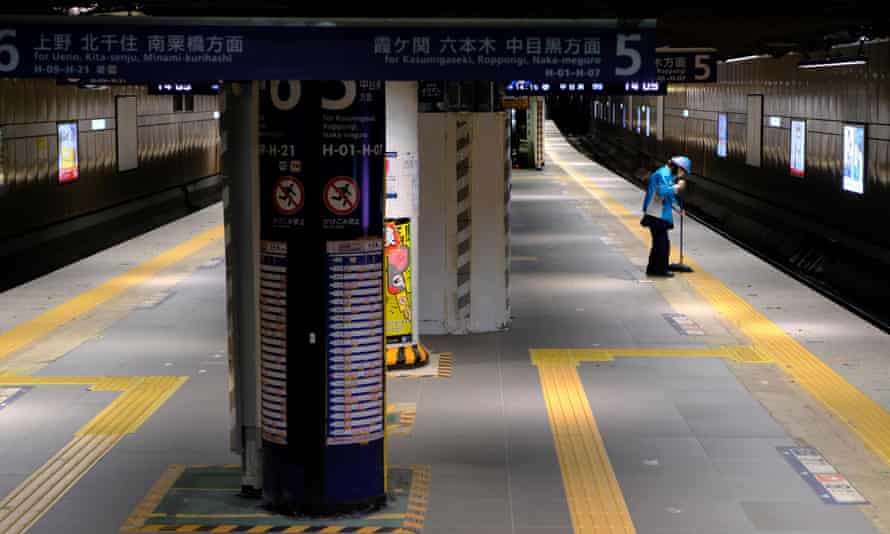The coronavirus had barely begun its surge across the globe when Ayako Sato was told that the nursery where she worked would temporarily close as part of Japan’s efforts to curb the outbreak.
The mother of two teenage daughters expected a few weeks of belt tightening, believing it wouldn’t be long before she was working again.
Month after she was laid off in March, Sato was skipping meals so that her children could eat regularly, wracked with guilt that she was unable to provide for them, let alone put a little cash aside each month for their university education.
“I love children, and really wanted to carry on working at the nursery, but lots of parents continued to keep their children at home, so there was no job to go back to,” Sato told the Guardian. “And the employment agency said there was nothing else for me.”
She made the best of modest welfare payments and a ¥100,000 universal cash handout the government hoped would help see households through the first wave of Covid-19 cases.
But by the summer, her finances – and her state of mind – had worsened.
“It got to the point that I seriously thought that my children would be better off financially if I was dead,” she said. “I thought they might have to quit high school and find jobs, even though that was the last thing I wanted them to do. They saw me crying every day, which must have been really hard on them.”
Sato, who is in her late 40s, was not alone. By the end of the year, more than 80,000 people in Japan had been laid off as a result of the pandemic, almost half of them employed, like Sato, in casual work.
Business closures hit women particularly hard. Although the number of women in the workforce has risen sharply in recent years, many work in dining, entertainment, retail, hospitality and other low-paid, non-regular jobs that now comprise about 40% of Japan’s labour market.
“Women are overrepresented in non-regular employment, where there is little job security, and after the schools were closed families had to scramble to secure childcare, which usually meant working mothers staying home,” said Machiko Osawa, an economics professor at Japan Women’s University in Tokyo.
‘A matter of survival’
About 60% of single-parent households reported worsening living circumstances in a November survey by the Japan Institute for Labour Policy and Training, with more than a third saying they could not afford to buy enough food.
Mounting job losses fuelled demand for food banks, prompted the government to release stockpiled rice to charities for the first time last month, while utilities have reported a surge in requests for deferments to bill payments.

Charity workers say they are seeing more women and mothers with small children at outreach events, even though they have traditionally been reluctant to join men in queues for food.
Under pressure from ruling party MPs, the government earlier this month started discussing a second emergency cash payment – this time targeting low-income households – according to media reports, while opposition MPs have called for the formation of an agency to address child poverty.
Chieko Akaishi, head of the nonprofit Single Mothers Forum, said her organisation had seen a steep in calls and emails over the past year from women seeking help.
“Many of them have lost their jobs and are struggling to provide for their children and pay their rent,” said Akaishi, whose organisation sends food parcels to more than 2,000 low-income households every month.
“This has been going on for a year now, and it’s taking a huge toll. I’ve heard the words, ‘I’m tired”’, and ‘I can’t go on,’ so many times. It’s become a matter of survival.”
A worrying indication of the mental health fallout from the pandemic came earlier this year, when figures showed that the suicide rate among Japanese women had risen sharply during the Covid-19 pandemic, even as it declined slightly among men.
The rate increased noticeably from July, as the impact of the pandemic began to spread. While male suicides fell by 1% in 2020, they rose 14.5% among women, according to the health ministry.
“For single people the pandemic has been even more isolating, and many have taken a big hit in wages because so many of them are in low-paid, non-regular jobs,” said Osawa. “Their financial distress has been amplified by their sense of isolation, and that helps explain the surge in female suicides.”
Sato, who divorced almost three years ago, says she feels more positive about the future now that she has secured part-time work in office administration after taking an IT course.
“Getting divorced was tough, but it was my choice to make a new start with my children,” she said. “But the virus is different. My daughters are growing up and becoming independent, but I know women with young children who are having a terrible time. In some ways I feel like I’m one of the lucky ones.”
This content first appear on the guardian
